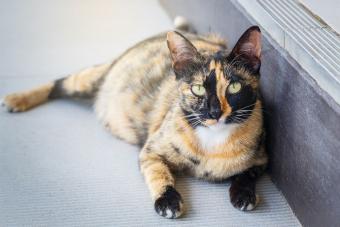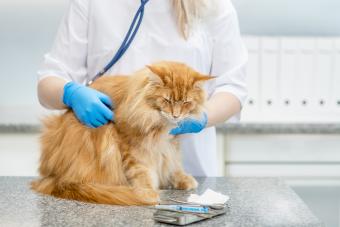
As soon as you feel a cold or the flu coming on, you’re careful to distance yourself from other people, but what about your cat friend? Can cats catch colds from humans? What about the flu? Get the deets on these and what you can do to keep human — and feline — safe and comfy this cold season.
Can Cats Catch Human Flu?
The Centers for Disease Control and Prevention (CDC) reports, "it is not uncommon for people to infect cats with seasonal influenza viruses.” It’s spread between humans and cats in much the same way as between humans and humans: through the air via sneezing or coughing, and through contact with contaminated surfaces. "Influenza infection in cats has generally resulted in mild illness," according to the CDC, but you can take the same precautions you would with other members of your household to avoid the spread. Of course, you can always call your veterinarian if you're worried or if your cat has other health concerns that could be impacted by the flu.
Signs that your cat may have caught your flu include:
- Sneezing
- Runny nose
- Eye discharge
- Low energy
- Decreased appetite
- Coughing
- Fever
The virus that causes COVID-19 can also infect pets. That means if you’re sick with COVID-19, it’s best to avoid contact with your cat until you’ve recovered.
Can Cats Catch Colds From Humans?
No, cats and humans don’t share the same cold viruses, so you can’t give your cat your cold. Most cases of the common cold are caused by human rhinoviruses (HRV). Cats have their own strains of cold anf flu viruses, like feline rhinotracheitis virus (also known as feline herpesvirus) and feline calicivirus. It’s true that cats and humans have many of the same symptoms when they catch a cold, like a runny nose, sneezing, watery eyes, and low energy, but the illnesses aren’t transmissible between the two species.
Cats and Bird Flu
There are past reports of cats who contracted H5N1 and H7N2, which are strains of bird flu. These viruses are very rare in humans, so it’s very unlikely for you to catch them and pass them on to your cat. But if you have poultry or birds and they become ill with bird flu, make sure you isolate them from your cat.
Keep an Eye on Your Cat This Flu Season
If you and your cat both have the sniffles at the same time, it’s very unlikely that you have the same thing. But while you’re loading up on fluids and vitamin C, it’s important to monitor your cat’s symptoms and have them seen by the vet if they worsen or don’t recover within a few days. Cat colds or flu can easily turn into full-blown upper respiratory infections, which often need antibiotics.







